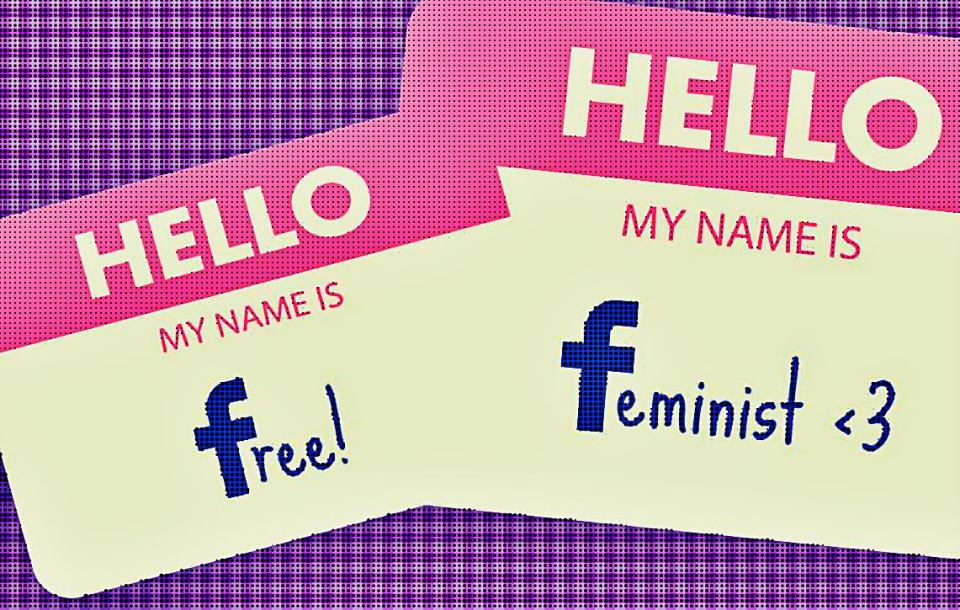
Facebook has said that every account should represent a real person, and that having an "authentic” identity is essential to the Facebook experience. But using a pseudonym does not mean that you are not a real person. Right? This policy is also said to help keep the online community safe.
There have been countless debates around Facebook's real-name policy. A policy that dictates how people set up their user profiles, more specifically which names they use. According to Facebook, the real-name policy is rooted in the perspective that in this way one will always know who they're communicating with. The will to implement this policy has been around since 2006. The touted aim is also to get rid of fake and spam accounts.
Facebook, however, does not take into account that safety is defined differently by different people. Users who cannot use their legal names are being targeted. Their accounts are reported, and suspended on a daily basis. There are many possible scenarios where one would want to or need to use a different name, for example victims of crime or LGBTQI (lesbian, gay, bisexual, transgender, queer, intersex) activists in countries where it is illegal. Or perhaps one just doesn't like the name given at birth. Given the “dream” policy that Facebook wants to keep the network safe for all, one needs to ask what some of the users think about this policy.
There have been serious human rights violations with regards to sexuality which occur both offline and online. When it comes to online freedom of expression, privacy and censorship one could almost guarantee discussions around gender and sexuality will arise. The real name policy is no different. The policy has been criticised by evictims of crime, and the LGBTQIA (lesbian, gay, bisexual, transgender, queer, intersex, asexual) community. There are many good reasons to stay anonymous online, whether it's because you live in a place where it's not safe to speak freely or because you want to find out more about a topic you don't want others to know you're interested in.
Between April 2015 and September 2015, the Association for Progressive Communications' (APC) EROTICS project conducted a flash online survey between their networks of LGBTQIA activists from around the world on Facebook’s “real name” policy to find out what they thought about this policy. Although the number of responses was small, it still showed some dispositions in activists' behaviours regarding this matter. The few responses that were received came from countries from all around the globe and it showed that the feelings toward the policy were more or less the same.
Anonymity as a choice
Out of 23, only five respondents said they used their name as written on their birth certificate, nine used a version of their legal name and nine used a pseudonym. You would think that having an identity online is very important but so is having the choice to remain anonymous.
Seven respondents said that they have been contacted by Facebook at some point about their profile and asked for official proof of their identity. In addition three had received a notice that their account was temporarily suspended. Two had been told that someone had reported objectionable content on their account, and one respondent said that they had been permanently locked out of their account/s when they could not provide proof of identity.
The powers behind Facebook really do not make any effort to find out why exactly it's users choose to use the names they do. Singers and actresses often use their stage names because that is how they are recognised by society, yet instead of removing or suspending their accounts, they get their accounts verified. Yet Facebook had absolutely no problem in suspending the accounts of drag queens that also used their stage names. How does Facebook justify its differential treatment of celebrities and drag queen performers and where is the fairness in this process?
There is always a reason why someone would want to remain anonymous. There may be LGBTQIA people that have not told their families yet and are seeking advice from people who may have gone through similar experiences. By giving their legal names, it exposes them to a greater risk of scrutiny and their families finding out about them before they are ready.
Anonymity or the choice of being who you want to be online is important also if you do not want every facet of your life popping up in a Google search. Many companies these days check social media accounts prior to offering employment. Not everyone wants their data logged and stored, and our data changes constantly as we as human beings constantly change our minds.
Two-thirds of respondents (16) said that they would not feel safe if they were identified by their real name on Facebook. The reasons for this include: they do not want their family and job compromised due to their sexual practices or identity; they fear harassment online and offline, and they have privacy concerns.
Many users may be in danger if they reveal their personal details online depending also on the context of the country where they reside. However, being online in this day and age has been pivotal for networking, marketing, and activism. “It feels necessary for my survival and success in modern society. I feel trapped and forced to use it.”, says a participant in this survey.
Seven respondents said that they have been contacted by Facebook at some point about their profile and asked for official proof of their identity. In addition three had received a notice that their account was temporarily suspended. Two had been told that someone had reported objectionable content on their account, and one respondent said that they had been permanently locked out of their account/s when they could not provide proof of identity.
These responses take you back to “celebrities” being able to use their stage names. Why are they not asked for proof of identity? I'd assume that their legal documents do not have their stage names on them yet their accounts are verified. How is this policy then equally applied to all Facebook users?
Facebook is as an online platform where one socializes with people as we would do offline. Not everyone introduces themselves by their legal names in the offline sphere either and we don't go around asking people for identification documents.
These are a few ways in which the respondents have been affected by Facebook’s “real name” policy:
| I stopped posting about my personal life in Facebook | 12 |
| I worry about the safety of my friends and networks | 12 |
| I felt less safe on Facebook | 10 |
| I had to change the audience for my past Facebook posts | 9 |
| I felt that my safety was compromised | 8 |
| I left Facebook | 7 |
| I felt confined to a name | 6 |
| I have stopped using Facebook for my activism on SOGIE issues | 6 |
| I have stopped posting on LGBTQI issues | 5 |
| I have become more open with my friends and networks | 4 |
| I have received abusive comments and threats | 4 |
| I am cautious about accepting other LGBTQI people as friends | 3 |
Based on the above results, one confirms that users have been affected and it's clear that this policy is limiting and even leads users to leave Facebook completely.
“I had to come out to some family and it negatively affected our relationship as a direct result of FB name policy”, says another participant.
Most responses were firmly against the 'real name' policy. One, for example, noted that the policy “silences our perspectives”. Another described it as “awful, social control” which puts people in danger. A third noted that it prevented people from talking openly about their sexuality because of fear that “one day someone will see something and make our lives harder than it is nowadays”. Another noted similarly that activists in many countries needed to keep their real identity concealed in public spaces or otherwise they could face persecution, harassment, or even imprisonment. One participant observed, that as an author it is a must to be on social media but the real name policy exposes them to being sexually harassed or stalked if they wrote controversial or explicit material.
There are as many as 81 countries worldwide that still have criminal laws against sexual activity by lesbian, gay, bisexual, transgender or intersex people (LGBTIs), or repressive laws against “propaganda of homosexuality.” (Lithuania, Russia). In these countries, one could say that the real name policy is doing more harm than creating a safe online environment.
By simply forcing people to use their legal names, Facebook is putting their lives and safety at risk. A report of the Special Rapporteur on torture and other cruel, inhuman or degrading treatment or punishment mentions that, “LGBTI persons are disproportionately subjected to practices that amount to torture and ill-treatment for not conforming to socially constructed gender expectations. […] Private actors [also] typically inflict torture and ill- on such persons in a climate of impunity as many States fail in their due diligence obligations to combat, prevent and remedy abuses.”
Facebook should alter this policy for its LGBTQIA users or at least take into consideration all spheres of their user base. These debates around this policy indicates that the users that they are trying to keep happy simply are not happy. Further research should be conducted to see just how far the reach of these views are. Currently, on Facebook it is easier to report a “wrong name” than to report an actual case of online violence. It is possible to consult different groups working on sexuality that have sufficient resources and knowledge, to propose to Facebook what would be the best solution to keep everyone safe. Facebook should not wait until something first goes seriously wrong before they realise the loop holes in this policy.
Footnotes
* What names are allowed on Facebook?, Facebook Help Centre. (Visited on 19/07/2016) https://www.facebook.com/help/112146705538576
- 4972 views






Add new comment